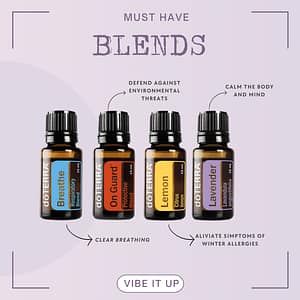Winter is a season of immense beauty, but unfortunately, it’s also accompanied by allergies that can disrupt our daily lives. The common cold, flu, sinusitis, and other respiratory ailments become more common during this time of the year. The cold weather combined with dry air and closed spaces can lead to an increase in seasonal allergens, making it hard for affected individuals to breathe properly. Common winter allergies include indoor pet dander, dust mites, mold, and pollen. Fortunately, essential oils can help alleviate the symptoms of winter allergies and make life more comfortable.
Essential oils have been used for centuries for their therapeutic properties. They are extracted from plants and have a natural fragrance that can help ease respiratory issues, clear congestion, and reduce inflammation. Unlike conventional treatments that may cause unwanted side effects, essential oils are natural and safe to use.
The main essential oils for winter allergies are peppermint, eucalyptus, lavender, and tea tree. Peppermint is a natural anti-inflammatory that helps to clear the airways and ease breathing difficulties. Eucalyptus is a powerful decongestant that can help to relieve coughs and chest congestion. Lavender is an anti-inflammatory that can help to reduce inflammation in the respiratory system. Tea tree is a natural antihistamine that can reduce allergy symptoms such as itching, sneezing, and watery eyes.
We have so many brands available for you to choose, but in my opinion, DoTerra essential oils are the perfect solution for winter allergies as they are of premium quality and backed by years of research and testing, making them reliable and effective. They have been specially formulated to harness the natural essence of plants to provide effective health benefits to users. In order to make it easier for you, we have outlined the best DoTerra essential oil blends for winter allergies and their benefits:

-
Breathe Blend – This blend is a powerful formula that supports clear breathing and respiratory functions. It includes laurel leaf, peppermint, eucalyptus, tea tree, lemon, and ravensara essential oils. The peppermint helps to soothe sore throats and clear sinuses, while eucalyptus helps to decongest the respiratory tract.
-
On Guard Blend – This blend is a protective powerhouse that helps defend against environmental threats. It includes wild orange, clove bud, cinnamon bark, eucalyptus, and rosemary. The cinnamon bark and clove bud stimulate immunity and kill airborne pathogens, while the eucalyptus helps to relieve sinus pressure.
-
Lemon – Lemon is a powerful essential oil that can alleviate symptoms of winter allergies. It has antiseptic and anti-inflammatory properties that help to strengthen the immune system and fight against germs. It also helps to reduce symptoms of cold and flu.
-
Lavender – This oil has soothing properties that help to calm the body and mind during the winter season. It helps to reduce stress and anxiety levels that may cause allergic reactions. It also has antihistamine properties that help to reduce symptoms of allergies.
Using essential oils for allergies is much better than common remedies like antihistamines and decongestants. These conventional treatments may provide temporary relief, but they can also cause drowsiness, dry mouth, and other unwanted side effects. Essential oils are natural and do not have any side effects if used properly.
In addition to providing relief for allergy symptoms, essential oils also have many other benefits for your health. They can help to boost your immune system, reduce stress and anxiety, improve sleep quality, and promote overall wellness. The best part is that a little goes a long way, so you don’t have to use a lot to get the desired results, making it not too pricey as it may seem…
We have listed some of resources available for people who want to learn about essential oils. With the help of books and apps like the ones mentioned below, anyone can learn how to incorporate essential oils into their daily routine and experience their many benefits. 😊
Books:
-
“Aromatherapy for Beginners” by Anne Kennedy – This book provides a basic understanding of essential oils, their benefits, and several essential oil recipes to try out.
-
“The Complete Aromatherapy and Essential Oils Handbook for Everyday Wellness” by Nerys Purchon and Lora Cantele – This book has detailed information on different essential oils, their properties, and how they can be used to improve wellness.
-
“The Essential Oil Maker’s Handbook” by Bettina Malle and Helge Schmickl – This book is for those who want to create their own essential oils and provides detailed steps to do so.
Apps:
-
Essential Oils Guide – This app provides a comprehensive guide to essential oils, including their properties and benefits. It also includes suggested blends for different purposes.
-
EOTools – This app provides information on over 40 different essential oils, and you can search for specific oils based on their properties.
-
doTERRA Daily Drop – This app provides daily tips for using essential oils, including recipes and blends.
In conclusion, the use of essential oils for winter allergies is a simple, natural, and cost-effective solution for those wishing to avoid over-the-counter medications, or who are looking for an additional option that can be used in conjunction with them. Essential oils offer a wide range of therapeutic benefits, from helping to reduce inflammation to relieving congestion. Furthermore, these all-natural products are easy to use and have been proven by recent studies to be effective in reducing symptoms associated with winter allergies.








